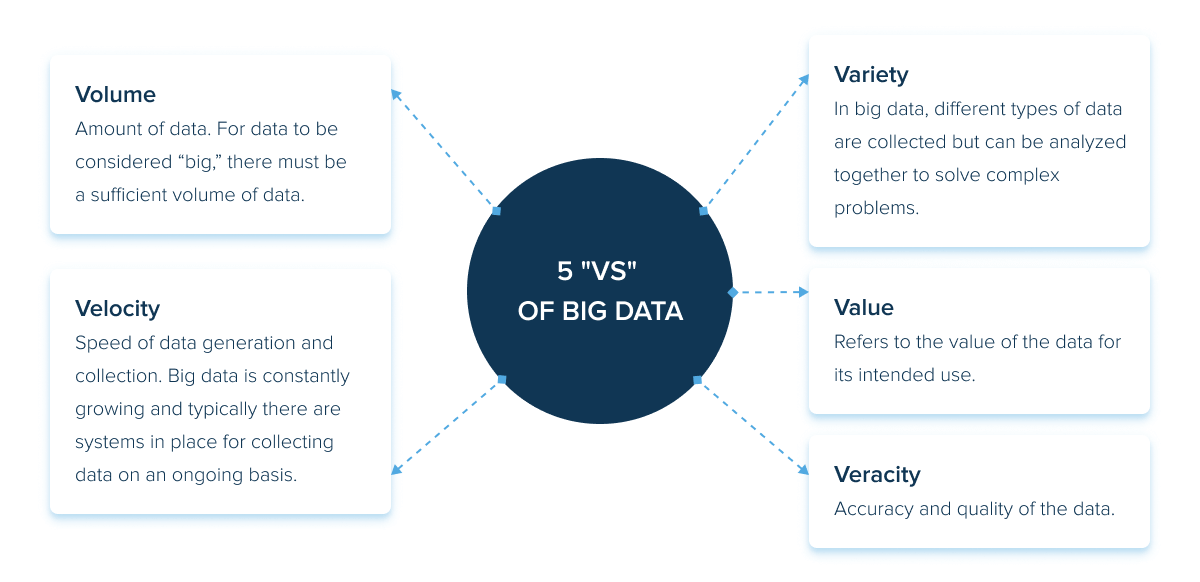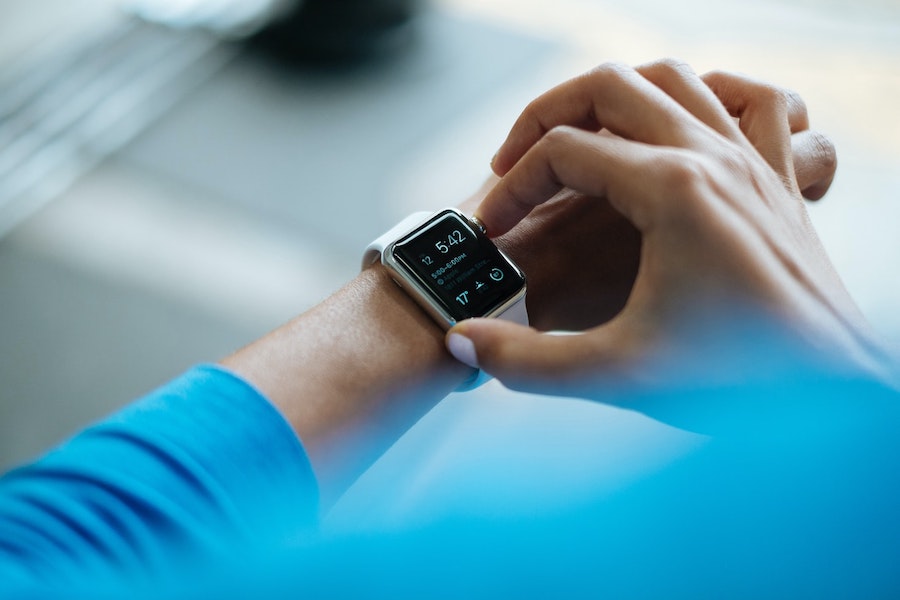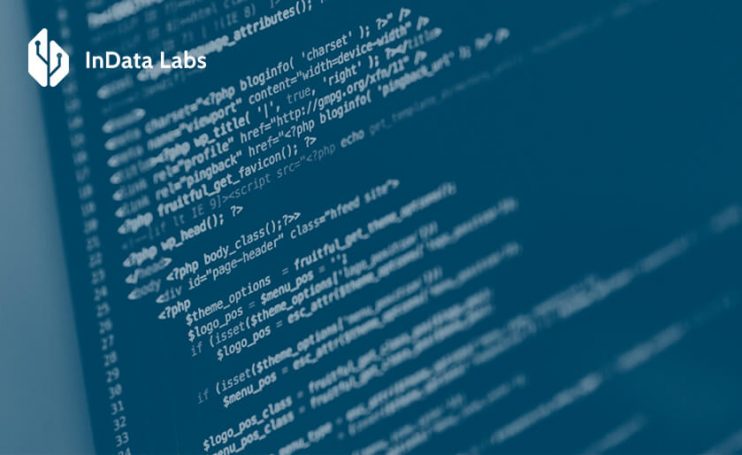At first glance, industries like healthcare and social media don’t seem to have much to do with one another. But as we continue to advance within the Information Age, nearly all industries are beginning to have something in common: they all use Big data applications.
The human brain has its limitations when it comes to collecting and processing data. Machines, however, can quickly and effortlessly leverage the power of raw data by automatically capturing it at the source and allowing data science experts to extract the most relevant data and insights from huge datasets.
It takes significant expertise to set up these systems and effectively analyze the data they process, but using these techniques can help organizations across industries to gain the many benefits of Big data applications.
The basics of Big data
Data alone is not considered to be “Big data.” But what makes Big data so “big”? Essentially, it has to do with several qualities a dataset may possess. Within the industry of data science, there are 5 “Vs” that can be used to define Big data. They are:

In order for Big data to be useful, data experts must create structure and use segmentation to extract valuable insights. To do this, they use tools like Hadoop, which is a suite of open-source software produced by Apache. The Hadoop framework provides data professionals with the ability to store and process data effectively so it can be used.
Machine learning is another key technology used within the Big data industry. It is a form of artificial intelligence that “learns” based on the data it processes. How machine learning works for Big data applications depends on context. For example, machine learning could be used to improve object detection over time.
Applications of this technology are ways in which the data is used. Big data can be applied in different settings to eliminate guesswork, streamline operations, make predictions for strategic purposes, and prevent errors. Each industry has its own applications for Big data, many of which have revolutionized their respective sectors and markets over the last few years.
Big Data applications in business
Where can it be used? Anywhere and everywhere! Big data uses and applications are virtually limitless for organizations in industries of all kinds. Top Big data applications include predictive analytics, business development, and the design of Internet of Things (IoT) devices, which can enable additional data collection.

Source: Unsplash
A decade ago, the industry of Big data analytics was still in its relative infancy. Today, however, even small businesses can leverage the power of Big data. Businesses using Big data can gain a competitive edge or cut operating costs to improve profits. The benefits of these applications vary depending on the industry and organization, but almost every company can improve its service and bottom line by investing in Big data tools.
So, what are some of the top Big data applications across industries? Here are 11 examples of how Big data and its applications are changing the way different sectors operate in fundamental ways.
Healthcare optimization for an improved patient experience
The healthcare industry is one of the most complex sectors in the world, as it combines the need to serve a human population with intricate business systems. As the industry is responsible for human health, well-being, and saving lives constantly, the system needs to be as efficient, effective, and error-free as possible.
Big data is changing healthcare in many positive ways. There is still a lot we don’t understand about human health, the body, and how illnesses develop. Big data is being used to better understand aspects of health like risk factors to improve patient outcomes.

Source: Unsplash
Error prevention is also an important Big data application within the healthcare industry. Human error is responsible for many tragic outcomes and preventable patient deaths. Big data tools can be used to catch common errors like potential medication interactions and save lives.
Data is also being used to improve the patient experience overall, bringing greater personalization and efficiency to the field of medicine. Hospitals are using predictive analytics and other Big data functions to reduce wait times, optimize staff hours, and improve other operational bottlenecks that affect patients and increase costs.
Banking sector advancements using data
In banking, the tech is being used to maintain personalization and prevent losses in the financial sector. When most people used local banks, they would be served by people who knew them and could provide personalized financial advice. Now, that advice comes from artificial intelligence, as Big data and machine learning.
Banking customers start their digital profile from scratch and create a picture of their spending habits over time. As more data is collected and analyzed, the picture of that customer’s financial situation becomes clearer. This allows banks to automatically send out personalized financial advice to customers without the need for human intervention.

Investment banking relies heavily on Big data in decision-making. Although the stock market is inherently volatile, Big data applications help bankers make strategic investment decisions for greater profits.
Application of Big data in Internet marketing
Marketing is an ever-evolving industry that adapts alongside technology. Today, digital marketing is the dominant method for advertising companies and their products. The application of the technology in internet marketing has been revolutionary in increasing the effectiveness and return on investment (ROI) potential of marketing campaigns.
When you break it down, marketing is an industry based on psychology. Human nature doesn’t change all that much, but an audience’s preferences and expectations will evolve over time. Marketers must understand their ideal customer in as much depth as possible—and Big data can help.
Marketers now can collect data on existing and potential customers across platforms, which can provide powerful insights when the collected data is analyzed. Social media is a goldmine of data that can be used to refine marketing techniques, down to factors like when to post and where to target advertising. Using the insights gained from data tools can help marketers improve their messaging and tactics over time and perform smart budget allocation based on predictions of paid marketing campaigns outcomes.
Streamlining manufacturing with Big data
Manufacturing is a complex industry involving large and intricate supply and shipping chains. Now that we are far removed from the days of processing goods locally, an increasingly complex information management system is needed to ensure that these chains operate smoothly. The technology can help to not only manage supply chains but also to reduce waste and optimize the industry.

Source: Unsplash
Anticipating demand is an enormous challenge within the manufacturing sector. Using predictive analytics and risk analytics, companies can more effectively forecast demand and avoid overproducing or under-producing goods based on the behavior of the consumers who buy those products.
Smart manufacturing facilities are also emerging. Using IoT devices, manufacturers can improve their efficiency, energy use, and tool maintenance schedules. Big data is invaluable in these applications because these systems can analyze a range of different factors that contribute to waste and inefficiency.
Government & law enforcement Big data applications
In government, Big data has far-reaching applications, ranging from tax compliance to traffic management. Government organizations are notorious for their inefficiencies and “red tape,” which results in wasted taxpayer dollars and slow progress. It can help so many ways to alleviate these problems.
City management is an emerging concern in the 21st century. As people gravitate toward large population centers, issues like housing, social services, traffic, and public transportation become increasingly relevant. Big data can help local and federal governments to understand large-scale trends so solutions can be implemented.
Besides spotting patterns, such tech solutions can be paired with IoT devices, such as smart speed limit signs, peak-hour lane adjustments, and transit alert systems. Additionally, governments can use data collection to understand areas that might need more services based on the needs of the population.
Law enforcement is also using Big data to prevent crime and apprehend criminals. A good example of this is CODIS, the FBI’s database for forensic evidence. These kinds of databases allow law enforcement in different areas of the country to search massive datasets for matches to evidence found at crime scenes.
Another application of the technology in law enforcement is crime mapping. Using crime data, law enforcement can see which areas are experiencing more or less crime and the likelihood of different criminal activity in an area.
Infrastructure: Big data application in power systems
Modern society uses a huge amount of power daily. Power outages are a minor inconvenience at best, and deadly at worst. Environmental concerns and weather conditions are all wrapped up in the function of power systems, making the industry the perfect candidate for big data solutions.
“Smart grids” are becoming more common as the need to regulate energy use increases. Big data can understand patterns of usage and direct energy resources to different areas as needed. This reduces strain on power grids while ensuring energy needs are met.
Insurance
In the United States and worldwide, insurance is an extensive business. It is a volatile industry that revolves around risk and involves dynamic pricing. For insurance companies, Big data has been perhaps the biggest game-changer to ever emerge within the industry.

Source: Unsplash
Insurance companies use Big data to more precisely understand the risks involved with insuring certain people, properties, assets, or groups. Using historical data and models, insurance companies can set rates more logically and gain insights that allow them to maintain profitability in an ever-changing landscape.
Big data for media & entertainment: understanding consumer preferences
Media has always been a fairly unpredictable industry, based on the whims of culture and the hopes of creating something that sparks public attention. Thanks to Big data, however, media and entertainment giants are capitalizing on trends and creating hit after hit.
How do Netflix and other modern media companies make their money? By understanding their customers’ preferences, interests, and behavior better than anyone else. Netflix’s success is due to complex algorithms that analyze what people watch, how long they watch, and what they pass over.
Media companies create content based on what has performed well in the past. That’s always been the case, but Big data provides more than just the revenue coming from each piece of content. It provides insights and connections that allow creative projects to evolve and come to life for precisely targeted audiences.
Scientific and medical research gets a boost with Big data
By nature, science and medicine move slowly. Moving too quickly leads to serious errors that can have long-term consequences. Researchers need to consider their hypotheses and innovations from every angle and ensure safety and accuracy as much as possible.
While the tech hasn’t changed any of that, it has reduced some of the friction and risk inherent in the industry. Medical researchers have benefitted from the ability to use Big data to find subjects for clinical trials more efficiently, identify safety risks, and even eliminate the need for a control group. Remote data collection is often possible thanks to IoT-powered wearables.
Scientific research can be accelerated by using large datasets to help determine causation versus correlation. This eliminates many different bottlenecks and helps ensure accuracy. Speeding up this kind of research ethically and safety can provide benefits to society much more quickly.

Source: Unsplash
Big data benefits nonprofits & social causes
Our world grapples with many unique challenges, including social and environmental issues that affect the health, well-being, and quality of life of humans, animals, and other organisms. It can be difficult to understand the true scope of these problems or convince the public of their importance without clear data.
Big data can detect unexpected patterns that can help guide initiatives for the good of society and the planet. Nonprofit organizations can use this data in fundraising efforts and strategic planning. Governments can also leverage data for social good to allocate resources and set priorities.
Assessing and predicting weather conditions using data
Meteorologists acknowledge that it’s a challenge to predict the weather, but sometimes, an inaccurate forecast can mean the difference between life and death. Weather is becoming a larger concern as climate change influences the rate of extreme conditions. A natural disaster can be somewhat mitigated with accurate weather forecasting and real-time updates.
Sensors are used to collect weather data, and past patterns are used in Big data weather analyses. Although it is still not foolproof, these tools are providing experts with more accurate data that can be used to inform the public and mobilize disaster relief efforts in advance.

Source: Unsplash
Big data: creating a safer and more comfortable world
Big data analytics companies are shaping the world as we know it. While there are some privacy concerns surrounding the collection and use of data, the application of Big data in business has provided a huge range of benefits for organizations and citizens alike.
Big data and its applications continue to expand and grow as we generate more and more data. Whether businesses use Big data in development plans or governments use it to understand the needs of the population, we’re always learning more about how different factors interact.
These powerful tools need to be used ethically so they can help us solve both business and social problems. When it comes to Big data, considering long-term benefits and consequences is key. Applications for data analysis will continue to grow and help us make sense of our world and our place within it.
Author bio
With a Bachelor’s in Management Information Systems along with an MBA, Ryan Ayers is a researcher and consultant within multiple industries, including information technology, blockchain, and business development. Always up for a challenge, Ayers enjoys working with startups as well as Fortune 500 companies. After work, Ayers loves reading science fiction novels and watching the LA Clippers.
Enhance your business with Big Data Custom Solutions
Need help with Big data project development? Contact us at info@indatalabs.com and we’ll get back to you soon.



